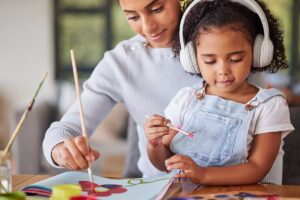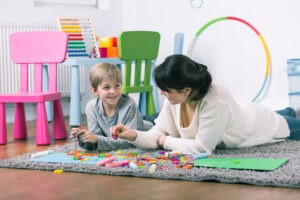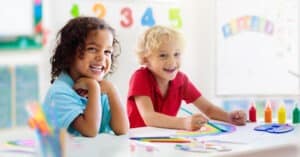Social Stories for Kids
Did you know that children learn more quickly during their first few years than any other time in their lives?
Kids are constantly trying to figure out the world around them, and they do this by learning through new experiences. Their guide for these experiences? Parents!
It’s been said that a parent is a child’s first and most important teacher. It’s up to us to help our children learn how to manage their thoughts, feelings, and actions in different social situations – building what’s called self-regulation skills.
These skills are what help your child mature from doing things like crying when asked to share their toys, running up and down the aisle on their first flight, or throwing a tantrum when you tell them you’re not buying that toy they want at the store.
Social stories are an easy, effective tool that parents can use to help children learn to adjust their behavior and emotions according to the situation they’re in.
Let’s explore the 5 W’s (and the “how”) of using social stories!
What is a social story?
A social story is a simple story that describes a social situation and the appropriate way to act in that situation.
The story can teach kids about a certain event (like their first trip to the Dentist), skill (such as sharing), or topic (for example, how everybody is different).
The simple language and pictures in social stories help children at various ages understand what to expect and how to respond in certain scenarios. Here’s an example of a social story for going to school:
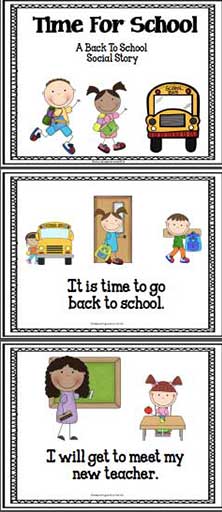
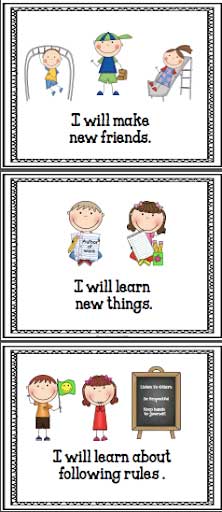
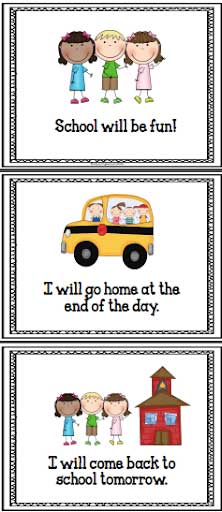
Who should use a social story?
Social stories can benefit all children!
Some children have delayed executive function skills that cause them to have less inhibitory control. They can have trouble managing impulses and choosing the most appropriate behaviors for a given situation. Social stories can help these children think about and practice a skill before the moment comes.
In general, kids thrive off of having routines. Knowing what to expect helps children feel safe and secure, and builds independence by giving them a sense of control, according to the U.S. Early Childhood Learning and Knowledge Center.
Reading a social story about a routine experience (like getting ready for bed) can help any child feel more prepared, including those who have trouble with transitions.
Social stories can help children prepare for new experiences, like getting their first haircut or starting school.
Social stories may also benefit children who have:
- Expressive or Receptive Language Delays
- ADD/ADHD
- Autism Spectrum Disorder
- Sensory Processing Disorders
- Behavior difficulties
- Anxiety
- Auditory Processing Disorder
- Social Skill Deficits
Where can I find a social story?
Many social stories on a variety of topics can be downloaded for free online. Websites like And Next Comes L and Teachers Pay Teachers have social stories on everything from handwashing to interrupting.
You can also create your own social story! This allows you to customize a social story to fit a specific event or social skill that your child may be struggling with, like their morning routine. Personalizing a social story that includes your child’s name and picture can benefit children who have a hard time taking the perspective of others.
Apps like Social Story Creator & Library can help you create a social story for your child.
When should I use a social story?
If possible, reading a social story a week or two before a new event or experience can be helpful for your child.
If you notice your child is struggling with a particular skill, like taking turns with others, it might be time to introduce a social story. The pictures give children a visual representation that can improve their understanding of the language you use when explaining a skill or social situation.
Why are social stories beneficial?
Social stories benefit children in many ways, including:
- Promoting Self-Regulation Skills. A child’s ability to manage their emotions and behavior is tied to stronger academic performance, fewer behavioral difficulties, and higher resilience.
- Developing Theory of Mind. Children are taught to take the characters’ point of view.
- Improved Social-Emotional Skills. Explicitly talking about how the emotions of others can help children better understand how their actions affect others.
- Clear Expectations. Straightforward explanations with pictures can improve a child’s cooperation with a task.
- Literacy Exposure. Making the connection between real-life events and written stories can improve a child’s narrative language skills.
- Simple Sequencing. Seeing illustrated scenes in order and hearing words like “first”, “next”, and “last”, helps children learn to sequence events.
How do I use a social story with my child?
Now, here’s how to get started using social stories with your child:
#1: Find the social story online that you want to use, or create your own.
#2: Print your social story. Consider laminating it or using sheet protectors to add durability. Or, download the story onto a tablet.
#3: Read a social story with your child anywhere, anytime!
#4: Consider role-playing the scenario after reading the social story.
#5: Re-read the story as needed to review the skill or event you want your child to learn and improve his or her understanding.
If you are concerned with your child’s social, self-regulation, or language skills, a Speech-Language Pathologist (also known as a “Speech Therapist”) can conduct an evaluation to assess these areas. The therapist will provide recommendations, which might include your child attending regular speech therapy to improve their skills. TherapyWorks is a company that provides Speech, Occupational, Feeding, and Physical Therapy Services via teletherapy across the US and in-home in Illinois, Ohio, and Michigan.


